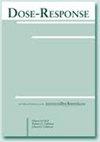重新审视吸烟的悖论:烟草烟雾中的放射性还是通过芳基烃受体信号抑制SARS-CoV-2受体血管紧张素转换酶2 ?
IF 2.3
4区 医学
Q3 PHARMACOLOGY & PHARMACY
引用次数: 0
摘要
尽管目前存在争议,但一些报告显示,与一般人群相比,有症状的COVID-19患者吸烟具有矛盾的缓解作用。为了解释COVID-19住院患者数量减少背后的潜在机制,有人假设吸烟可能通过胆碱能介导的抗炎机制降低细胞因子风暴和相关严重炎症反应的几率。日本科学家最近发现了吸烟者比不吸烟者感染COVID-19病例更少的潜在机制。然而,我们认为这种减缓效应可能是由于香烟烟草中天然存在的放射性核素(如Po-210)释放的α粒子沉积能量相对较高。关于COVID-19,其他研究人员和我们的团队此前已经研究了低剂量电离辐射的抗炎和免疫调节作用。使用Geant4蒙特卡罗工具包进行mc模拟表明,单个5.5 MeV α粒子在半径为0.9 μm的球形电池中吸收的辐射剂量约为5.1 Gy。这种能量沉积可能引发抗炎和抗血栓作用,这反而降低了吸烟者因COVID-19住院的风险。本文章由计算机程序翻译,如有差异,请以英文原文为准。
Revisiting the Paradox of Smoking: Radioactivity in Tobacco Smoke or Suppressing the SARS-CoV-2 Receptor, Angiotensin-Converting Enzyme 2, via Aryl-Hydrocarbon Receptor Signal?
Despite current controversies, some reports show a paradoxical mitigating effect associated with smoking in individuals with symptomatic COVID-19 compared to the general population. To explain the potential mechanisms behind the lower number of hospitalized COVID-19 patients, it has been hypothesized that cigarette smoking may reduce the odds of cytokine storm and related severe inflammatory responses through cholinergic-mediated anti-inflammatory mechanisms. Japanese scientists have recently identified a potential mechanism behind the lower numbers of COVID-19 cases amongst smokers compared to non-smokers. However, we believe that this mitigative effect may be due to the relatively high concentration of deposited energy of alpha particles emitted from naturally occurring radionuclides such as Po-210 in cigarette tobacco. Regarding COVID-19, other researchers and our team have previously addressed the anti-inflammatory and immune-modulating effects of low doses of ionizing radiation. MC-simulation using the Geant4 Monte Carlo toolkit shows that the radiation dose absorbed in a spherical cell with a radius of .9 μm for a single 5.5 MeV alpha particle is about 5.1 Gy. This energy deposition may trigger both anti-inflammatory and anti-thrombotic effects which paradoxically lower the risk of hospitalization due to COVID-19 in smokers.
求助全文
通过发布文献求助,成功后即可免费获取论文全文。
去求助
来源期刊

Dose-Response
PHARMACOLOGY & PHARMACY-RADIOLOGY, NUCLEAR MEDICINE & MEDICAL IMAGING
CiteScore
4.90
自引率
4.00%
发文量
140
审稿时长
>12 weeks
期刊介绍:
Dose-Response is an open access peer-reviewed online journal publishing original findings and commentaries on the occurrence of dose-response relationships across a broad range of disciplines. Particular interest focuses on experimental evidence providing mechanistic understanding of nonlinear dose-response relationships.
 求助内容:
求助内容: 应助结果提醒方式:
应助结果提醒方式:


